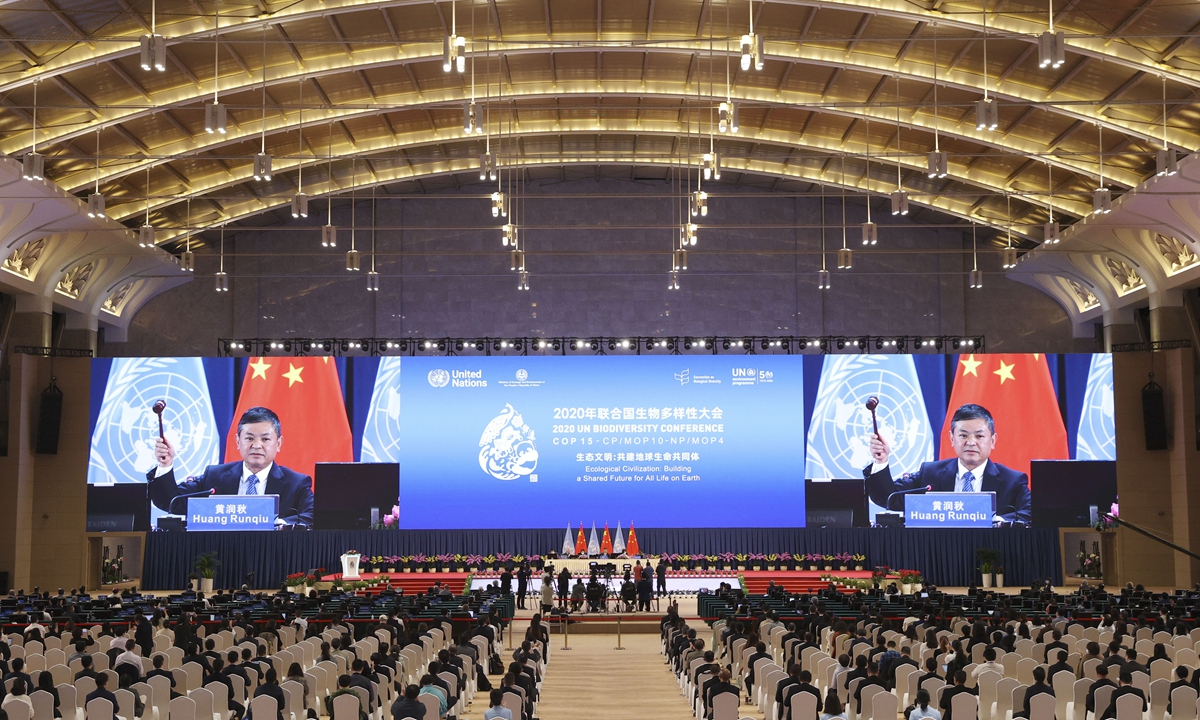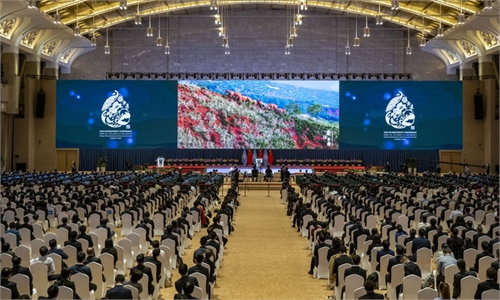COP15 adopts Kunming Declaration, a message of unity to facilitate future negotiations on biodiversity

Chinese Minister of Ecology and Environment Huang Runqiu declares the adoption of Kunming Declaration during a COP15 meeting in Kunming, Southwest China's Yunnan Province, October 13. Photo: Xinhua
A declaration on joint efforts and momentum to halt and reverse the loss of biodiversity was passed on Wednesday in Kunming, Southwest China's Yunnan Province, at the 15th meeting of the Conference of the Parties to the UN Convention on Biological Diversity (COP15).
Chinese Minister of Ecology and Environment Huang Runqiu declared the adoption of the declaration titled "Towards an Ecological Civilization: Building a Shared Future for All Life on Earth" at the High-Level Segment of the first part of COP15.
The declaration will send a powerful signal, showing the world our determination to solve the problem of biodiversity loss, and our stronger action on the issues discussed at this high-level meeting, Huang said.
The Kunming Declaration embodies the consensus of all parties, shows the political determination of all parties to take action to address the challenges of biodiversity and jointly build a community of life on earth, Zhao Yingmin, vice minister of the Ministry of Ecology and Environment, said at Wednesday's press conference.
In the Kunming Declaration, Parties vowed to accelerate formulating or revising biodiversity action plans in each country, set up or optimize a reserve system, actively improve the global environmental legal system and increase funding and technical support for developing countries to achieve the post-2020 global biodiversity framework to push protection and restoration of land, freshwater and marine biodiversity.
The Kunming Declaration is the main achievement of this conference. The declaration commits to ensuring the formulation, adoption and implementation of an effective post-2020 Global Biodiversity Framework to reverse the current loss of biodiversity and ensure that biodiversity is on the path to recovery by 2030 at the latest to fully meet the 2050 vision of living in harmony with nature.
Uruguay's Ambassador to China Fernando Lugris told the Global Times in Kunming that the declaration is a very important political message because it's a message of unity.
The declaration sets the tone for future negotiations, and we need to act to adopt the post-2020 biodiversity framework next year which will set new targets and a new level of ambitions for the international community, Lugris said.
Bangladeshi Ambassador to China Mahbub Uz Zaman told the Global Times that the declaration is political support, a pledge made by world leaders to save the planet, and political support is very important. If we don't have it for projects or targets, we cannot achieve them.
The ambassador also hailed the 1.5 billion yuan ($233 million) fund proposed by China, as climate vulnerable countries like Bangladesh can benefit from it.
He said Bangladesh will learn from China's efforts in ecological protection and reforestation.
Lugris also spoke highly of the fund, which added impetus and created an atmosphere for discussions in Kunming.
The declaration was made with China's coordination, reflecting the nation's enduring commitment to biodiversity protection. With a consensus, concrete negotiations and actions can be made, Qin Tianbao, professor and director of the Research Institute of Environmental Law at Wuhan University, told the Global Times on Wednesday.
Qin, who is also chief expert with the Academy of International Law and Global Governance at Wuhan University, said the protection of biodiversity is more complex than tackling climate change, where countries negotiate on a simpler goal of carbon reduction. Biodiversity, the protection, use and share of relevant resources, plus the situations in different countries, make the issue complex, he said.
One major power has long been absent in global biodiversity protection efforts - the US. It hasn't approved the Convention on Biological Diversity 30 years after signing it.
US utilitarianism has prompted it not to join many global biodiversity protection conventions, and US biofirms are part of the reason, experts said.
Qin said joining those conventions would increase US firms' costs to access bio resources in many developing countries, and add pressure on them to provide funding and transfer technologies on biodiversity protection.
Zhao Lijian, a spokesperson of the Chinese Ministry of Foreign Affairs, said on Wednesday that the US' absence has damaged global biodiversity protection efforts, and urged it to cast aside utilitarianism and assume its responsibilities.



